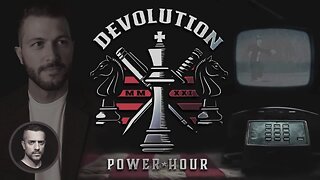Premium Only Content

Episode 2005: On the Way to the Crucifixion: Do not weep for me - Part 15
This is the 15th of the 22 last statements of Jesus before His death:
(Luke 23:28) Speaking to the women along the way: "Daughters of Jerusalem, do not weep for me; weep for yourselves and for your children."
Imagine Jesus stopping while carrying the cross to speak to the women who are crying for Him. The mere fact that he stops to address them tells us that what He has to say is vital for them and for us to hear. And though He speaks to a few women He addresses them as “Daughters of Jerusalem” because they represent all the women of Jerusalem, they are people of Israel.
He says to them first, “Do not weep for me…” telling them they no longer need to be concerned for Him. He does not want them to weep for Him out of sympathy for His own personal tragedy. He has accepted the divine will of His father and is ready to die. And even though He knows there will be more pain and suffering on the cross, HIS pain will soon be over. Soon He will raised again and with His Father. Rather His concern is for them.
He then tells them, “...weep for yourselves and for your children.” Meaning they should be weeping for their nation and posterity and for the sin in the world.
In Luke 19:41-43 we read what Jesus saw as He came into Jerusalem, “And when he drew near, seeing the city, he wept over it, saying: If thou also hadst known, and that in this thy day, the things that are to thy peace; but now they are hidden from thy eyes. For the days shall come upon thee, and thy enemies shall cast a trench about thee, and compass thee round, and straiten thee on every side… And beat thee flat to the ground, and thy children who are in thee: and they shall not leave in thee a stone upon a stone: because thou hast not known the time of thy visitation.”
Jesus then says, “It is written: My house is the house of prayer. But you have made it a den of thieves.”
Jesus has already wept for Jerusalem and He tells the women that they should weep for Jerusalem too.
And in the Old Testament, the prophet Jeremiah, in 9:19-20 also called on the women of Jerusalem to mourn for the fate of their city. He said, “For a voice of wailing is heard out of Sion: How are we wasted and greatly confounded? because we have left the land, because our dwellings are cast down. Hear therefore, ye women, the word of the Lord: and let your ears receive the word of his mouth: and teach your daughters wailing: and every one her neighbour mourning.”
Bishop Fulton Sheen said of this moment, when Jesus stops to talk to the women weeping, “If there was any one moment when Our Lord might have been preoccupied with His own sorrows and have taken the tears of others as a solace for His grief, it was this moment on the way to Calvary, and yet He bade the women to shed no tears for Him. He Who wept at Bethany and Whose Blood now wept on the road of Jerusalem, bade them not to weep for Him, for His death was a willed necessity—willed freely by Him, but a necessity for men. Furthermore, since He had promised to wipe away all tears, tears for Him were needless.”
I will conclude with a quote from C.S. Lewis on Good Friday: “There is, to be sure, sorrow on Good Friday. But do not feel sorry for Jesus. He knew exactly what He was doing. He loves you; He goes to the cross for you. How could He have done anything less? And if there must be tears, weep not for Jesus, but for your sins and greater still for His love.”
Thank you for listening.
-
 15:04
15:04
MetatronGaming
1 day agoOriginal Commodore 64 VS C64 Maxi - Review and Comparison
37 -
 9:46
9:46
MattMorseTV
10 hours ago $7.75 earnedTrump just SHUT DOWN a $287,000,000 FRAUD RING.
6.59K51 -
 15:48
15:48
GritsGG
12 hours agoWinning a Rare Solos Prison End Game on Warzone!
59 -
 11:37
11:37
The Pascal Show
12 hours agoTHEY WANT TO END HER?! Candace Owens Claims French President & First Lady Put A H*t Out On Her?!
791 -
 LIVE
LIVE
Lofi Girl
2 years agoSynthwave Radio 🌌 - beats to chill/game to
243 watching -
 24:30
24:30
DeVory Darkins
13 hours agoMarjorie Taylor Greene RESIGNS as Minnesota dealt MAJOR BLOW after fraud scheme exposed
43.2K111 -
 2:19:48
2:19:48
Badlands Media
1 day agoDevolution Power Hour Ep. 409: Panic in the Narrative — Epstein, Israel, and the Manufactured Meltdowns
152K39 -
 1:52:38
1:52:38
Man in America
10 hours agoCommunists VS Zionists & the Collapse of the American Empire w/ Michael Yon
59K22 -
 4:09:34
4:09:34
Akademiks
5 hours agoSheck Wes exposes Fake Industry. Future Not supportin his mans? D4VD had help w disposing his ex?
35.9K3 -
 6:43:43
6:43:43
SpartakusLIVE
9 hours agoTeam BUNGULATORS || From HUGE WZ DUBS to TOXIC ARC BETRAYALS
108K3